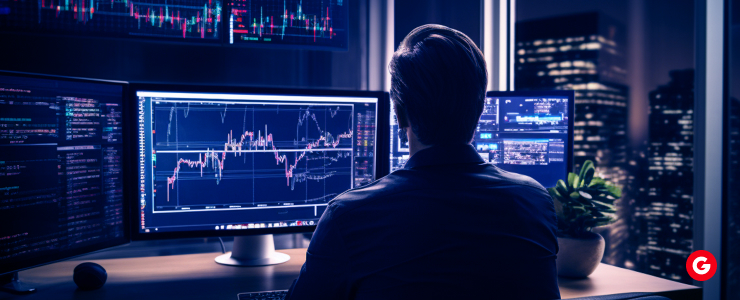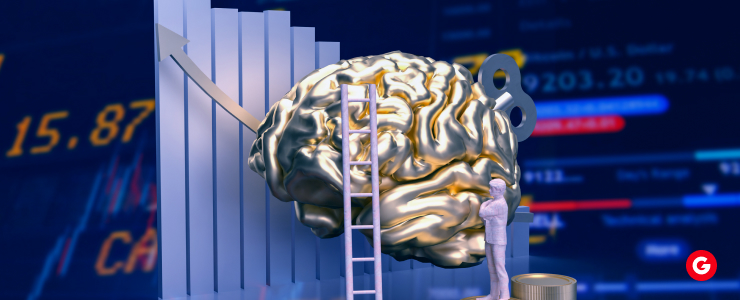Overtrading is a common problem in the forex market. It can seriously drain your capital, devastate your trading strategy, and potentially lead to large financial losses.
A trader overtrades if the trader executes various trades that are too high. Overtrading often occurs without sufficient planning or risk management. Keep watching to find out how to recognize overtrading behaviors and strengthen your trading self-control.
What is Overtrading?
Overtrading is when someone executes far too many trades quickly, often more than the trader can risk. It usually starts with trading based on feelings, greed, or the fear of missing out (FOMO). In the forex market, Fomo can be dangerous, as certain traders may take meaningful risks without adequate analysis.
There are a few ways that overtrading can happen:
- High-frequency trading: carrying out many trades in one session without a solid strategy.
- Overleveraging is when too much leverage is employed to increase positions, creating risk.
The above-mentioned can create big losses and prevent traders from achieving continued profits in CFD and online trading.

Types of Overtrading: Things to Know
1. Emotional Overtrading
This happens when traders make rash decisions based on overwhelming fear, completely unyielding greed, or deep frustration. Losing streaks often pushes traders to enter revenge trades. These revenge trades are attempts to recover losses.
2. High Leverage Overtrading
Many traders use leverage incorrectly, thinking they can increase their earnings. Still, an excess of leverage in Metatrader 4 can make an account disappear.
3. Overtrading Due to Market Noise
Some speculators take action based on slight variations in the marketplace. They do not have a real strategy. This is, without a doubt, the case with MT4 trading platforms, where traders depend too much on indicators.
4. Compulsive Trading
Specific traders find it difficult to resist wanting to trade on many occasions. This happens even when the forex market does not have many potential chances. This stirs up completely pointless dangers.

Impact of overtrading on forex traders
Overtrading is one of the most common issues in Forex trading, often leading to monetary and mental anguish. Even though traders might believe that a higher trade volume equals a higher opportunity, this is not the situation.
The following depicts how Forex traders can be impacted by overtrading:
1. Increased Transaction Costs
Every trade in Forex thoroughly involves either a relatively prominent spread (the consequential difference between the bid and ask price) or a meaningful commission. Overtrading happens when someone trades too much. This leads to bigger costs that slowly lower possible earnings.
Imagine a trader with several trades daily. Each trade has a spread cost of 2 pips. Even if their business deals do not make or lose money, trading costs still make them lose a noticeable amount.
2. Poor Decision-Making
Emotions, instead of strategy, often lead to overtrading. Impulsive actions based on the market, revenge trading after a loss, or experiencing FOMO can lead to quick, not well-reasoned decisions.
For instance, a day trader spots a quick rise in EUR/USD and purchases without looking for a dependable trend. Then he realizes they purchased at the peak right before a large fall.
3. Account Drainage
Taking on too many risky positions—especially in leveraged trading like CFDs—can quickly deplete a trader’s account balance. If you execute various trades, your odds of experiencing losses that build up over time increase.
For example, a trader with a $5,000 account might risk 5% on each trade rather than a more cautious 1-2%. After several losses, they have about $2,000 in a few days.
4. Burnout and Stress
When experiencing burnout, focusing becomes considerably harder, decisions are negatively affected, and the chance of making careless trades is substantially greater.
For example, a trader who gets less sleep attempts to take advantage of many market changes and eventually starts making straightforward errors—like getting position sizes wrong or not noticing important economic news.
5. Missed Quality Trades
Traders who trade too much often fail to see setups that would probably make money. Rather than waiting for better opportunities, they keep occupied with average trades, using their capital and mental energy before a profitable trade occurs.
A trader makes many trades on small, choppy movements. The trader ignores a major breakout that could have yielded a superior reward.
6. Emotional Rollercoaster
Trading causes intense emotional ups and downs. When traders win often, they might become excessively confident and trade carelessly. On the other hand, frequent losses may cause traders to become frustrated and seek to make up for their losses through revenge trading. The cycle continues. This makes it more difficult for traders to remain disciplined consistently.
For instance, a market participant is profitable on five consecutive trades and starts to increase their position size without reason. The succeeding pair of negative outcomes gets rid of all prior positive results.
7. Inability to Stick to a Trading Plan
To trade with real success, you need a plan that is structured well; however, those who overtrade often drop their plans when the moment becomes intense. Haphazard trades are initiated as risk management is completely disregarded, and their established strategy is abandoned.
For example, one investor who at first intended to just make trades based on many trends suddenly starts scalping each small move.

What Causes Overtrading?
- Lacking a complete trading plan: Traders often depend on feelings instead of a solid strategy if they do not have a trading plan.
- Revenge Trading: Attempting to fully compensate for losses by opening additional trades.
- Traders may begin to believe they are infallible if they are experiencing a series of wins, which is overconfidence.
- FOMO (Fear of Missing Out): entering trades lacking sufficient analysis.
- Some traders become addicted to trading. These traders develop a compulsive need to trade constantly.
- Taking Advantage of Incorrect Use: Many traders overleverage, thinking it will increase profits.
Managing Overtrading
1. Develop a Solid Trading Plan
A trading plan can help keep impulsive choices aside. Before you execute trades in Metatrader 4, establish your entry points. Set your exit points before executing trades in MetaTrader 4.
2. Use Proper Risk Management
Figure out where to place your stop-loss orders. Do not risk more than 2% of your capital on any trade.
3. Stick to a Trading Schedule
Try not to sit at the MT4 trading platform all day. Take scheduled breaks and exclusively trade during particular conditions.
4. Use a Reliable Trading Platform
Selecting a reliable platform, like FxGiants, guarantees efficient operation and the availability of needed resources to handle risk effectively.
5. Keep a Trading Journal
Monitoring transactions in a journal can be helpful for noticing common trading actions and coming to improved decisions.
6. Control Your Emotions
Keep yourself distant from spiteful barters or decisions influenced by feelings. Uphold discipline and rigorously stick to a strategy.
7. Reduce Leverage Usage
While leverage can increase profits, it can also increase losses. When using leverage in online trading and CFD trading, exercise caution.
Conclusion
A primary cause of failure for forex traders is trading too much. It leads to many cost increases, and it also causes meaningful emotional stress along with meaningful financial losses. To avoid excessive amounts of trading, you need a degree of self-control, a sound strategy, and a suitable venue. FxGiants offers a secure and efficient MT4 platform for trading, successfully helping traders handle risk and perform greatly smarter trades.
FAQs
Is overtrading something good or something bad?
Overtrading is bad. It makes trading costs go up, creates large emotional stress, and some chance of losses.
How many trades in a day is too much trading?
If you’re placing trades without a clear strategy or risk management, even a definite number of trades per day can be overtrading.
Why do 95% of forex traders fail to profit?
Most traders lose money because of poor risk management, a lack of discipline, emotional trading, and overtrading. These are the causes.
Is overtrading illegal?
No, overtrading isn’t against the law; however, it is not recommended because it causes monetary downfalls.
What possible downsides exist regarding overtrading?
In online and CFD trading, excessive amounts of trading cause important transaction costs, emotional burnout, poor decision-making, and losing money.
DISCLAIMER: This information is not considered investment advice or an investment recommendation, but is instead a marketing communication
